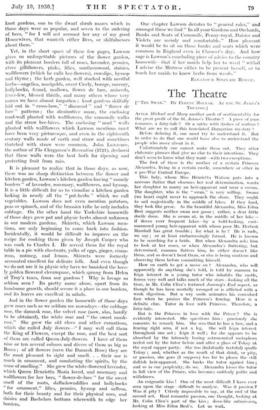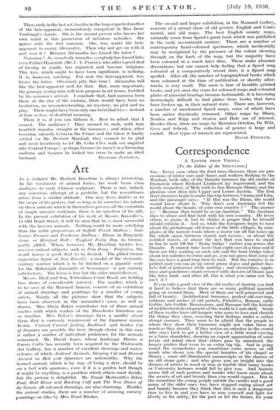The Theatre
[" Tim SwAx." By FERENC MOLNAR. AT VIE S•r. JAMES'S TnEATnE.1
ArrEn Michael and Mary another gush of sentimentality for the great profit of the St. James's Theatre ? A piety of pure romance, it fairy-tale'? Or a satire with dashes of realism'? What are we to call this translated Hungarian mystery ?
Before defining it, one must try to understand it. But in order to do that one would have also to understand the people who move about in it.
Unfortunately one cannot make them out. They utter elaborate phrases that give no clue to their intentions. They don't seem to know what they want --with two exceptions.
The first of these is the mother of a certain Princess Alexandra, living in a certain castle, somewhere or other in a pm-War Central Europe.
This lady, whom Miss Henrietta Watson puts into it nervous flutter that obscures her real determination, wants her daughter to marry an heir-apparent and wear a crown. The daughter, who is the " swan," is very willing. Swans (we hear) ought never to approach the shore. They ought to sail majestically in the middle of lakes. If they land, they look like geese. As the beautiful Alexandra, Miss Edna Best suggests neither swan nor goose ; rather, a dear little docile dove. She is swum at, in the middle of her lake— if doves ever frequent lakes— by a bold-looking, curt- mannered young heir-apparent with whom poor Mr. Herbert Marshall has great trouble ; for what is he ? He is rude, we say ; or at least embarrassingly formal. He is known to be searching for a bride. But when Alexandra asks him to look at her roses, or when Alexandra's fluttering, but determined, mamma flatters him, he either doesn't like them, and so doesn't heed them, or else is being cautious and observing them before committing himself.
How on earth to get a move on ? Alexandra, who will apparently do anything she's told, is told by mamma to feign interest in a young tutor who inhabits the castle, fences very well and talks much of the stars—looking all the time, in Mr. Colin Clive's tortured Journey's End aspect, as though he has been mortally wronged or is afflicted with u weak digestion. But a wry smile animates his convulsed face when he praises the Princess's fencing. Here is a definite clue. Tutor hi love with Princess. Therefore, a fairy-tale.
But is the Princess in love with the Prince ? She is evidently interested. She questions him ; graciously she consents to remark him. She sees that he has a face, and a fencing right arm, if not a leg. She will feign interest throughout one act ; feign it well ; for she appears to be absorbed by the intensely boring astronomical metaplmrs reeled out by the tutor before and after a glass of Tokay at the royal supper party. She too (habitually teetotal) quaffs Tokay ; and, whether as the result of that drink, or pity, or passion, she goes (I suppose) too far to please the still doltish heir-apparent. She backs the tutor against him ; and so in our perplexity, do we. Alexandra kisses the tutor in full view of the Prince, who becomes suddenly polite and withdraws.
An enigmatic kiss ! One of the most difficult I have ever seen upon the stage—difficult to analyse. Was it passion Was it pity ? Utterly impossible to say, at the end of the second act. Real romantic passion, one thought, looking at Mr. Colin Clive's part of the kiss ; dove-like submission, looking at Miss Edna Best's. Let us wait. Then, early in the last act, bustles in the long-expected mother of the heir-apparent, tremendously competent in Miss Irene Vanbrugh's hands. She is the second person who knows her own mind in this procession of nebulous nobodies. She agrees with the first mamma. She, too, wants the heir- apparent to marry Alexandra. Then why not get on with it and over it ? Because Alexandra has kissed the tutor ?
Nonsense ! As somebody remarks, everybody has kissed him, even Father Hyacinth (Mr. C. V. France), who after a good deal of kissing in youth, has repented and become religious. This kiss, which ought to have been significant, is nothing. It is, however, catching. For now the heir-apparent, too, kisses the tutor. Obviously pity this time ! Alexandra will like the heir-apparent well for that. But, more important, the grumpy young man will now propose in set terms, fortified by his mamma's arrival. I conclude that, had mamma been there at the rise of the curtain, there would have been no hesitation, no misunderstanding, no mystery, no plot and no play. There might have been only one betrothal kiss ; instead of four or five, of doubtful meaning.
There it is, if you can fathom it. Best to admit that I cannot. The audience ? They seemed to rush, with true heartfelt impulse, straight at the romance ; and when, after hovering uneasily between the Prince and the tutor, it finally settled on Mr. Herbert Marshall, they seemed to be glad and most heartlessly to let Mr. Colin Clive walk out unpitied into Central Europe ; perhaps because he wasn't in a becoming uniform and because he looked too cross to make an ideal

















































 Previous page
Previous page